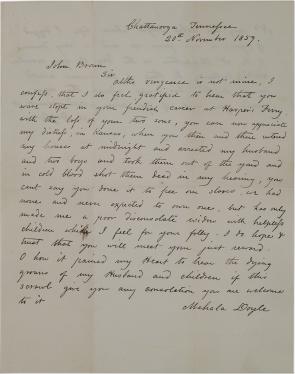"Bleeding Kansas" and the Pottawatomie Massacre, 1856
A Spotlight on a Primary Source by Mahala Doyle
 In 1854, the Kansas-Nebraska Act overturned the Missouri Compromise, which stated that slavery would not be allowed north of latitude 36°30′. Instead, settlers would use the principle of popular sovereignty and vote to determine whether slavery would be allowed in each state. Supporters of both sides flooded into the territory of Kansas, where violence soon erupted between pro-slavery and anti-slavery settlers.
In 1854, the Kansas-Nebraska Act overturned the Missouri Compromise, which stated that slavery would not be allowed north of latitude 36°30′. Instead, settlers would use the principle of popular sovereignty and vote to determine whether slavery would be allowed in each state. Supporters of both sides flooded into the territory of Kansas, where violence soon erupted between pro-slavery and anti-slavery settlers.
In retaliation for the "sack" of the free-state town of Lawrence on May 21, 1856, the abolitionist John Brown led a brutal attack on a pro-slavery settlement at Pottawatomie Creek on the night of May 24. This was an example of the kind of violence that alienated even his anti-slavery supporters. Brown and six followers killed five men, hacking at them with broadswords and cutting their throats before shooting them. Mahala Doyle, the wife and mother of three of Brown’s victims, expressed her bitterness and pain in this letter to John Brown. She sent it to him in November 1859 as he awaited execution after the Harpers Ferry raid.
A full transcript is available.
Transcript
Chattanooga Tennessee
20th November 1859.
John Brown
Sir
Altho vengence is not mine, I confess, that I do feel gratified to hear that you ware stopt in your fiendish career at Harper’s Ferry, with the loss of your two sons, you can now appreciate my distress, in Kansas, when you then and there entered my house at midnight and arrested my husband and two boys and took them out of the yard and in cold blood shot them dead in my hearing, you cant say you done it to free our slaves, we had none and never expected to own one, but has only made me a poor disconsolate widow with helpless children while I feel for your folly. I do hope & trust that you will meet your just reward. O how it pained my Heart to hear the dying groans of my Husband and children if this scrawl give you any consolation you are welcome to it
Mahala Doyle
NB my son John Doyle whose life I begged of (you) is now grown up and is very desirous to be at Charleston on the day of your execution would certainly be there if his means would permit it, that he might adjust the rope around your neck if gov: wise would permit it
M. Doyle.
